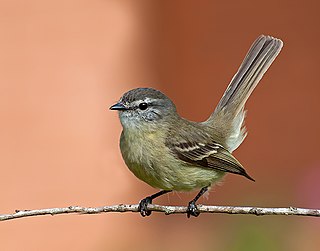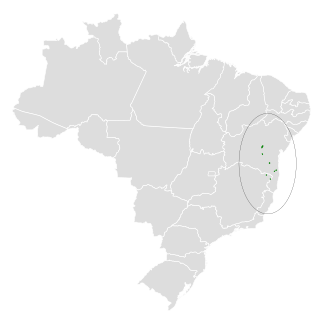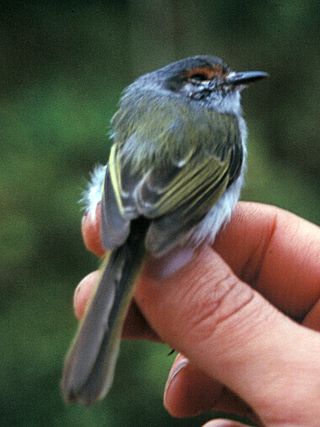
The buff-banded tyrannulet is a species of bird in subfamily Elaeniinae of family Tyrannidae, the tyrant flycatchers. It is found in Argentina, Bolivia, and Peru.

The white-tailed tyrannulet is a species of bird in subfamily Elaeniinae of family Tyrannidae, the tyrant flycatchers. It is found in Colombia, Ecuador, and Peru.

The planalto tyrannulet is a species of bird in subfamily Elaeniinae of family Tyrannidae, the tyrant flycatchers. It is found in Argentina, Bolivia, Brazil, and Paraguay.

The plumbeous-crowned tyrannulet is a species of bird in subfamily Elaeniinae of family Tyrannidae, the tyrant flycatchers. It is found in Colombia, Ecuador, and Peru.

The Bahia tyrannulet is an Endangered species of bird in the family Tyrannidae, the tyrant flycatchers. It is endemic to Brazil.

The Alagoas tyrannulet is a Critically Endangered species of bird in the family Tyrannidae, the tyrant flycatchers. It is endemic to Brazil.

The rufous-lored tyrannulet is a Near Threatened species of bird in the family Tyrannidae, the tyrant flycatchers. It is endemic to Venezuela.

The Panama tyrannulet or yellow-green tyrannulet is a species of bird in the family Tyrannidae, the tyrant flycatchers. It is endemic to Panama.

The Ecuadorian tyrannulet is a species of bird in the family Tyrannidae, the tyrant flycatchers. It is found in Colombia, Ecuador and Peru.

The restinga tyrannulet is a species of bird in the family Tyrannidae, the tyrant flycatchers. It is endemic to Brazil.

The black-fronted tyrannulet is a species of bird in the family Tyrannidae, the tyrant flycatchers. It is found in Brazil, Guyana, and Venezuela.

The cinnamon-faced tyrannulet is a species of bird in the family Tyrannidae, the tyrant flycatchers. It is found in Bolivia and Peru.

The Sao Paulo bristle tyrant, or Sao Paulo tyrannulet, is a Near Threatened species of bird in the tyrant flycatcher family Tyrannidae. It is found in Argentina, Brazil, and Paraguay.

The Minas Gerais tyrannulet is an Endangered species of bird in the family Tyrannidae, the tyrant flycatchers.

The rufous-browed tyrannulet is a species of bird in the family Tyrannidae, the tyrant flycatchers. It is found in Colombia, Costa Rica, Ecuador, Panama, Venezuela, and possibly Peru.

The bay-ringed tyrannulet is a species of bird in the family Tyrannidae, the tyrant flycatchers. It is found in Argentina, Brazil, and Paraguay.

The mottle-cheeked tyrannulet is a generally common, small species of bird in the family Tyrannidae, the tyrant flycatchers. It is found in Argentina, Bolivia, Brazil, Paraguay, Peru, and Uruguay.

The olive-green tyrannulet is a species of bird in the family Tyrannidae, the tyrant flycatchers. It is found in Brazil, French Guiana, Guyana, and Suriname.

The Bolivian tyrannulet is a species of bird in the family Tyrannidae, the tyrant flycatchers. It is found in Bolivia and Peru.

The slender-footed tyrannulet is a species of bird in the family Tyrannidae, the tyrant flycatchers. It is found in Bolivia, Brazil, Colombia, Ecuador, Peru, and Venezuela.
























